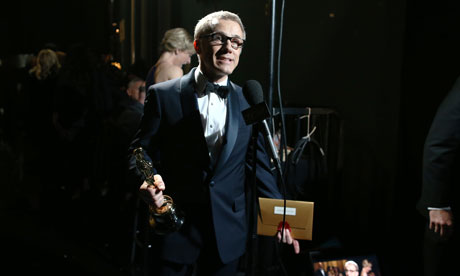Nate Silver and others took their statistical analysis to the film industry, but predicting awards might be tougher than elections

All but Farsite had Tommy Lee Jones winning best supporting actor – Farsite correctly picked Christophe Waltz. Photograph: Christopher Polk/Getty Images
While Oscar fans spent Monday checking their pools to see if they picked more winners than their friends, I was wondering whether statistics experts did a good job forecasting the results.
I found four websites that used a variety of statistical methods to predict winners. Ben Zauzmer, a Harvard sophomore, built a model from critics' ratings and results from other awards shows. Farsite used data such asresults from other awards shows, the total number of nominations, buzz, and prior nominations for actors and actresses. Nate Silver used awards shows as a kind of pre-election poll average. PredictWise combined prediction markets and user sentiment from games.
All four are at least somewhat affected by past awards shows. The first three make an index from previous awards, while PredictWise puts a lot more emphasis on what everyday people (whether through betting markets or games) thought – and obviously they must be heavily influenced by previous awards shows, too.
None of them made any big misses. They all agreed on Daniel Day-Lewisfor best actor, Jennifer Lawrence for best actress, Argo for best film and Anne Hathaway for best supporting actress.
The categories where they disagreed is where the errors occurred. All but Farsite had Tommy Lee Jones winning best supporting actor for Lincoln. Farsite correctly pegged Christophe Waltz in Django Unchained.
Those who missed here recognized the difficulty. PredictWise had Jones only at 44% to win with Waltz just behind at 40%. Zauzmer put Jones at 43% and Waltz at 34%. Silver's miss was worse than either PredictWise in that he had Philip Seymour Hoffman in The Master just slightly ahead of Waltz in probability. The reason seems to have something to do with Hoffman garnering more nominations for his role in other contests. Even so, Silver still called it the "most competitive category".
The worst miss in the major six was best director. Credit must go to Zauzmer who had Ang Lee for Life of Pi as the favorite. The rest hadSteven Spielberg for Lincoln. I say "worst" miss because both Farsite and PredictWise had Spielberg at over 75% to win. The miss was particularly bad for Farsite because it tended to be quite conservative in its percentage chances to win and only had Hathaway at a greater chance to win an award. Silver, to his credit, called it a tossup for lack of data.
Thus, the final scores were Farsite and Zauzmer five for six, and PredictWise and Silver four for six. I really wouldn't read very much into these small differences. It's a very small sample size, not significant to make a judgement about which models are better predictors or better calibrated (ie understanding uncertainty).
When we expand to the 21 categories prognosticated by both Zauzmer and PredictWise, they score evenly at 17 out of 21. Both had Lincoln third in best production design, even though it won. In addition, Zauzmer did not get Django Unchained in best original screenplay or Skyfall for best cinematography, while PredictWise failed to peg Les Misérables in best makeup and hairstyling.
A more important point to take away is that there was at least one statistical predictor got it right in all six major categories. That suggests that a key fact about political forecasting holds for the Oscars: averaging of the averages works. You get a better idea looking at multiple models, even if they themselves include multiple factors, than just looking at one.
This average of the averages held among the wider 21 categories. In only one, best production design, did one of the four not get it. A little over 95% of the time did we have at least some idea of what was coming. This is pretty comparable to election polling.
The overall lesson here is that while we won't always know the winner from any one model, we will rarely be too surprised so long as we take into all the statistical models. My guess is that 17 out of 21 or about 80% is a pretty good guide of what the best systems can do. There's no sign that anyone has cracked any sort of code here. They all did about as well and together gave us a very good heads-up as to who would win.
No comments:
Post a Comment